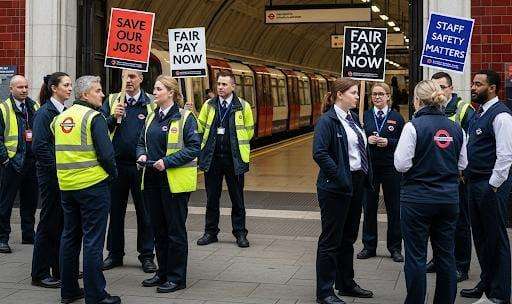Hundreds of London Underground workers are at risk of losing their jobs and facing deportation following recent changes to the UK’s immigration rules, which have raised salary thresholds for visa sponsorship and reclassified key transport roles. Union leaders fear as many as 300 staff members, primarily customer service assistants, could be impacted, with some facing a deportation deadline as early as November.
This escalating crisis prompted more than 100 union activists, led by RMT general secretary Eddie Dempsey, to stage a protest outside the Home Office. The demonstration, which was also attended by MPs John McDonnell and Zarah Sultana, was a public call for the government to suspend the new rules. The RMT union confirmed that at least 63 of its members are directly affected, while Maryam Eslamdoust, general secretary of the TSSA union, estimated the total number of at-risk staff across Transport for London could be as high as 300.
"Knee-Jerk" Policy Affecting Hard-Working Londoners
The controversial policy changes, which took effect earlier this year, increased the required salary for a skilled worker visa to £41,700 a year for new applicants. Crucially, roles like Tube station assistant were removed from the official "skilled worker" list. Many foreign-born staff were hired on two-year graduate visas with the expectation they would eventually transition into permanent skilled worker positions. Now, they find themselves in a precarious situation, with their visas set to expire and no clear path to remain in the UK.
Speaking at the protest, Eddie Dempsey accused the former Home Secretary of a "knee-jerk decision" driven by political pressure. He argued that the rules were changed at "breakneck speed" via statutory instrument, circumventing proper parliamentary debate and scrutiny. Dempsey emphasized that these workers "were given a clear indication that they would be here permanently" and have since built lives, brought families, and bought homes. "They are proper people doing a job here in London," he said, "and they should be allowed to stay."
The TSSA union highlighted a particularly poignant case of a station worker who, due to the new rules, found his salary was just £1 below the new threshold, potentially costing him his job and right to remain.
A Call for Fairer Policy and Government Action
In response to the growing crisis, both unions and politicians are calling for urgent action. The RMT and TSSA are urging the government to suspend the new rules until the Migration Advisory Committee publishes its advice next year. Additionally, they want transitional arrangements put in place to protect the affected workers. The TSSA has also asked Transport for London to increase staff salaries to meet the new threshold and is lobbying the government to reclassify transport roles as skilled work.
Elly Baker, a Labour transport spokeswoman on the London Assembly, attended the protest to "stand in solidarity" with the affected workers, describing the policy changes as "arbitrary" and "unfeeling."
The Home Office responded to the criticism by stating that its immigration strategy aims to "strengthen the domestic workforce, reduce dependency on overseas labour, and boost economic growth." They insisted that sectors must focus on training British workers or risk losing access to the immigration system, a move they believe will reinforce the integrity of the points-based system.








.svg)


